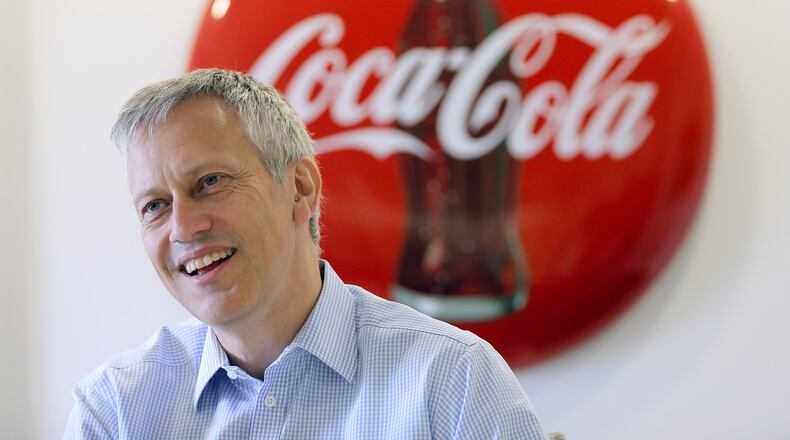A big gap exists between what Georgia's largest companies now say is important and what they pay their chief executive officers to focus on.
Customers, employees and investors are increasingly pressing corporations to prove they are caring organizations with social value beyond higher stock prices. Even with stock markets near record highs, just 23% of people polled by Gallup in June had much confidence in big business.
Under that backdrop, the Business Roundtable, an organization of many of the nation’s top CEOs, made national news last month by redefining the primary purpose of corporations. After two decades of saying shareholders were paramount, the group declared that benefits for customers, employees, surrounding communities and suppliers were equally important. Nearly 200 CEOs, including some at Georgia’s largest public companies, signed the statement.
But company boards of directors currently tie the vast majority of CEO pay-for-performance to traditional financial metrics, with growth in stock value being king, according to an Atlanta Journal-Constitution review of Georgia corporate filings.
Consider the case of Coca-Cola.
The beverage giant has for years highlighted its investments in communities, including empowering women, protecting water and reducing waste. But that’s not what Coke’s board focuses on when it sets specific pay incentives for CEO James Quincey, who signed the Business Roundtable’s new statement.
The softer items apparently affected less than 1% of Quincey’s $16.7 million in compensation last year. They were included with about a dozen mostly traditional business measures that together accounted for $150,000 of his pay, according to a company filing with the federal government. Meanwhile, Quincey landed millions of dollars in incentives tied to financial metrics such as net operating revenue, earnings per share, free cash flow and total shareholder returns.
At Home Depot, little or none of CEO Craig Menear’s $11.4 million compensation last year was tied directly to metrics focused on the broader issues highlighted in the Business Roundtable’s statement, which Menear also signed. The same appeared to be true at both UPS, where CEO David Abney pulled in $15.1 million, and at Columbus-based Aflac, where chairman and CEO Dan Amos had $17.5 million compensation in 2018.
Some boards give themselves wiggle room.
While not tied to specific listed metrics, the UPS board has discretion to adjust CEO incentives somewhat based on a range of issues, including leadership, strategic planning, addressing issues facing employees and “ensuring the Company is contributing to the well-being of the communities in which it operates.”
It wasn’t clear from UPS’s corporate filing whether any of the CEO’s pay was directly affected by his handling of employee or community issues, but if it was, it did not appear to be a significant portion of his payout. The company didn’t provide a breakdown.
Many other big Atlanta-based companies also stress that in addition to focusing on shareholder value, they care about their impact on the broader community.
“These things have been important to Home Depot for decades because it is part of our core values with the company,” spokesman Stephen Holmes said.
Defenders of how CEO pay is determined say stock performance doesn’t happen in a vacuum — if you don’t take care of customers or employees, your share price will eventually reflect that.
Giving other groups equal footing with shareholders in determining CEO pay muddles evaluations, said Charles Elson, who has often been a pay critic and directs the University of Delaware’s John L. Weinberg Center for Corporate Governance. “If you are accountable to everyone, you are accountable to no one.”
There are other challenges. One concern is that it can be difficult to come up with parameters that accurately measure new focus areas. Another involves the readiness to evolve.
“Cultural change doesn’t happen overnight,” said Joe Mallin, an Atlanta partner at executive pay consulting firm Pay Governance.
But pressure is growing — even from shareholders.
Last year, 72% of institutional investors and consultants said they use principles tied to environmental, social and governance as part of their investment approach, according to RBC Global Asset Management.
Some companies are moving to have more direct ties between CEO pay and such broader issues.
Coke “understands the need to better reflect some specific metrics in our executive compensation targets, such as for sustainability,” spokesman Scott Leith wrote in an email to the AJC, adding the company is working on it.
And the board for Atlanta-based Southern Company recently disclosed it is linking up to $2 million of CEO Tom Fanning's pay this year to reducing greenhouse gases discharged by Georgia Power, AGL and other subsidiaries.
Delta Air Lines isn’t a member of the Business Roundtable, so CEO Ed Bastian didn’t sign the statement. But a company spokesperson said the statement aligns with Delta’s longstanding philosophy.
Last year, about 25% of Bastian’s annual and long-term pay incentives were directly linked to customer service and satisfaction: on-time arrival, baggage handling, flight completion and measures of customer willingness to recommend the airline to others.
The company also has set environmental and sustainability goals, but those weren’t tied to CEO pay, according to the company’s latest proxy filing.
About the Author
The Latest
Featured




